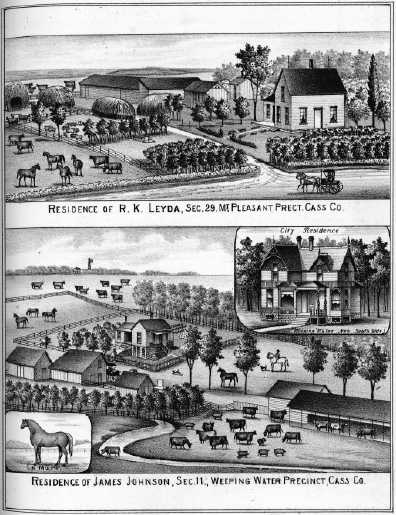where he bought forty acres of land,
and continued farming and raising fruit until 1873,
when he sold out and removed to Wabash, Neb., where he
now has an elegant farm of 160 acres, well improved
and thoroughly equipped with modern appliances, which
make farming a source of pleasure, as well as of
profit. He is a strong Republican in politics, and
takes a great interest in the success of his party. He
is fifty-seven years of age, and the mother the same.
The lady is the eldest of five children, was born in
Carroll County, Ohio, Jan. 26, 1860, emigrated to
Michigan with her parents, and was there married. They
have one child, Leo, born March 5, 1882. She is a very
kind, companionable lady, devoting herself to the
comfort and pleasure of her family and friends. Our
subject is a member of the A. F. & A. M. at
Weeping Water, Lodge No. 97, has been through all the
Chairs, and Master for two years. He served one term
on the School Board, and at present is Assessor.
During his spare hours Mr. Johnson
has studied the English language, until he has
mastered it so well that he would not be taken for a
foreigner, judging from his language. He says that
America has given him chances he would not have had in
his mother country, consequently he is an American
through and through. On another page is shown a view
of Mr. Johnson's comfortable residence.

 EUBEN
K. LEYDA and his excellent wife, who in her girlhood
was Miss Catherine Shoup, are numbered among the
well-known people of Mt. Pleasant Precinct who have
built up for themselves a good homestead, and whose
course has been such as to commend them to their
neighbors. Their property is pleasantly situated on
section 29, and fulfills, in the air of plenty and
comfort which surrounds it, the modern idea of the
well-regulated rural home, where peace and plenty
abound. The farm is 160 acres in extent, and since
settling upon it in March of 1881 many improvements
have been effected by Mr. Leyda, who has gradually
gathered together the litttle (sic) comforts and
conveniences which have so much to do with the
happiness of a household. Mr. and Mrs. Leyda are
people at the prime of life. and after years of
arduous labor are now enabled to rest upon their oars,
taking satisfaction in watching the growth and
development of the country around them, looking after
the comfort and well-being of their children, and
doing good unto their neighbors as they have
opportunity. EUBEN
K. LEYDA and his excellent wife, who in her girlhood
was Miss Catherine Shoup, are numbered among the
well-known people of Mt. Pleasant Precinct who have
built up for themselves a good homestead, and whose
course has been such as to commend them to their
neighbors. Their property is pleasantly situated on
section 29, and fulfills, in the air of plenty and
comfort which surrounds it, the modern idea of the
well-regulated rural home, where peace and plenty
abound. The farm is 160 acres in extent, and since
settling upon it in March of 1881 many improvements
have been effected by Mr. Leyda, who has gradually
gathered together the litttle (sic) comforts and
conveniences which have so much to do with the
happiness of a household. Mr. and Mrs. Leyda are
people at the prime of life. and after years of
arduous labor are now enabled to rest upon their oars,
taking satisfaction in watching the growth and
development of the country around them, looking after
the comfort and well-being of their children, and
doing good unto their neighbors as they have
opportunity.
The birth of our subject took place
in Clinton Township, Wayne Co., Ohio, March 6, 1834.
His father, James Leyda, was a native of Washington
County, Pa., and in early manhood married Miss Hulda
Sanford, who was born on Long Island. The Leyda family
trace their ancestry to Ireland, while from his mother
our subject has inherited some of the best qualities
of New England stock. James Leyda was occupied mostly
with farming during his lifetime, and spent his last
years in Ohio, departing this life in March, 1880. He
was one of the earliest settlers of Wayne County,
Ohio, locating in a log cabin in the wilderness, and
in common with the pioneers around him experiencing
the hardships and privations incident to the time and
place. The mother is still living in Wayne County,
Ohio.
Our subject was the second son and
third child in a family of nine children, and was
reared to man's estate in his native county, assisting
in the development of the pioneer farm, and receiving
a limited education in the primitive school. His
parents realized the advantage of a good education,
and did what they could for their children in this
direction. Reuben, after leaving the district school,
was given instruction by a teacher of a select school,
and made such good progress that he himself developed
in time into a pedagogue, He followed teaching briefly
in his native county.
Mr. Leyda in leaving his native
State was accompanied by the estimable lady who now
bears his name, and to whom he was married March 25,
1858. Mrs. Catherine (Shoup)) Leyda was born in
Tuscarawas County, Ohio, May 2, 1836, and is the
daughter of John and Nancy (Foreman) Shoup, the former
a native of Ohio, and the latter of Pennsylvania. The
paternal ancestors originated in Germany, and the
family was represented in the United States probably
150 years ago. When Catherine was a little girl of
seven years her parents removed from Tuscarawas to
Holmes County, dur-
|


